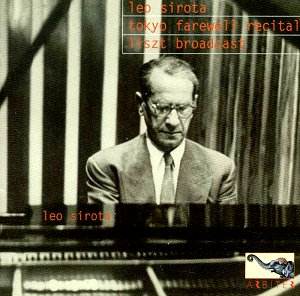The
second of my encounters with Leo Sirota takes us to his Tokyo
Farewell recital made in 1963, two years before the pianistís
death. The Ukraine born Busoni student had come to the Italian
highly recommended by Glazunov. His Viennese start was auspicious
and he first visited Japan, then clamouring for Western classical
musicians (see the visits of Burmester, Thibaud, Szigeti, Butt
and many others) in 1928 intending a brief visit. He and his wife
stayed eighteen years. They were even there during the War when
they were evacuated to a remote location and lived in tough circumstances.
In 1946 he moved to St Louis to take up a position at the Institute
of Music. Sirota did record but relatively sparsely and his discs
have always been hard to track down; the existence, in various
collections, of fifty hours of Sirota broadcasts and performances
is a boon to collectors who have reason to be grateful that such
material is now appearing.
The
farewell recital began with the two Scarlatti pieces, the Pastorale
rather sleepy and rhythmically endangered, and the Capriccio slightly
better. His Beethoven Sonata grows in strength; itís true that
he can be capricious with the rhythm and that his thunderous bass
attacks (something of a trademark) can be over scaled but thereís
much here thatís immediately impressive. I like his way with the
contrastive material in the Scherzo Ė and one can almost feel
the increased confidence as he essays strong accents and shows
a real sense of style in his playing. As ever heís not note perfect
but then again he was seventy-eight. When he unleashes the bass
led torrents of the presto con fuoco finale itís certainly something
to hear.
Itís
in the Schubert that he reaches the apex of his playing in this
last recital. There is real sensitivity here and he brings out
the pensive introspection and increasing unease with acumen and
insight. There is a powerful sensibility at work in the slow movement,
a sense once more of stylishness but also of direction. Heís a
strong-willed and impulsive musician but adopts precisely the
right tempo for the poco moto indication. The Scherzo certainly
isnít, as we have seen from him, note perfect but it possesses
a pithy and dramatic quality that makes up for a lot and the Rondo
finale is most delightful.
Some
years earlier heíd recorded Liszt in one of his regular St Louis
broadcasts. These 1955 survivals show once more the cracks in
his technique Ė sometimes Sirota makes Cortot look like Horowitz
in that respect Ė but there are notable compensations. Thereís
a little tape damage on Sposalizio but itís relatively minor and
wonít curtail enjoyment. This is a rather slow reading and somewhat
italicised but it does have baritonal sonorities in the left hand
and the climax, though rather too late in the day, is strong.
The Don Juan Fantasy probably shouldnít have been attempted on
a technical level but Iím glad he did it anyway. For all the manifold
slippages and very splashy moments Ė and there are many Ė the
carapace of the interpretation is fascinating. Itís wonderfully
grand and declamatory, heroically charged and shows what a Liszt
stylist he was; maybe not one in Petriís class but then Petri
recorded much of his Liszt at a much earlier age. It makes one
wonder what Sirota would have done on disc with his Liszt just
before his Japanese sojourn say, when electrical equipment could
have done justice to his playing. But thatís one of those imponderables
that emerge when the body of an artistís work emerges in middle
to late age.
Once
more the Arbiter booklet is well written and full of documentary
interest and the photographs are both evocative and of good quality.
If youíre hesitating because of Sirotaís technical frailties,
donít.
Jonathan
Woolf
